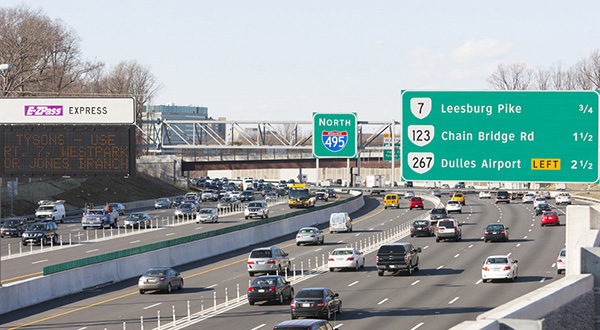
The value of hundreds of billions of dollars remains trapped within potential infrastructure resources throughout the United States, Transurban North American President Jennifer Aument told Transportation Today, and a reexamination of those assets could aid economic recovery efforts related to COVID-19.
The U.S. is hurting economically as a result of the pandemic, and the transportation sector is no exception. Traffic, travel and tourism are down, and the outlook is uncertain as to when they will recover. As many ponder how to innovate to counteract this, Aument has stressed the need for expanded public-private partnerships (P3s) and more involved thought into what they entail.
Transurban is the developer and operator of a P3 project in the Greater Washington-Northern Virginia area: the 95/495/395 Express Lanes. That project has brought approximately $4 billion to the region, with the 395 Express Lanes the latest to have been brought into operation last November.
That operation is minuscule compared to the potential value left on the table across the country, though. Untapped infrastructure resources represent 10 times the value of natural resources globally, Aument said, particularly in places like the United States.
“Take the toll road industry. With the top 10 major toll road authorities, we could drive $180 billion of upfront payment or long-term annuity streams to rebuild the economy,” Aument said. “That’s a fraction of what’s out there.”
She also argued the benefits of a partnership on such projects could go both ways, representing more than a financial transaction. Aument looked at the business as a long-term partnership. For the government, investments could be made upfront or over time, as needed. Private industry has greater flexibility of capital structure, technology deployment, and revenue-generating strategies, such as mobile options, that would provide citizens savings over time while allowing for reduction of congestion and increased efficiency.
America has been behind in this area since even before COVID-19, Aument pointed out, and billions of dollars are needed nationally to be able to shore up departments of transportation so they can do what they need to do.
“If you’re in state government, it would be a normal conversation for government decision-makers to look at the natural resources they have that could be beneficial for drawing income,” Aument said. “Much less often are government officials talking about the assets they have in terms of transportation fees and how they could deliver for government as well.”
Yet Aument believes the current market has left people with a greater willingness to approach sophisticated conversations about how to change that. While governments might be naturally attracted to upfront payments from businesses to consider other options, Aument also noted that proper partnerships could involve long-term annuities, regular, ongoing payments that would shore up their revenue streams for other programs.
It’s hard to escape the politicization factor of things like toll roads, though. Affordability is a major issue, as is how best to deliver better outcomes for customers. Aument believes private industry involvement would be able to avoid the political pitfalls that have mired many governmental efforts to revamp infrastructure, and in turn, allow them to set long-term, stable pricing and provide greater certainty.
Companies like Transurban have learned from international work, where P3s are more prevalent and historically successful. The Australian-based company cited work that has led to reduced customer fees, decreased accidents, quicker incident response times and solid transportation budgets for the state. But every market has its differences, and Aument alluded to the complexity of the U.S. market requiring tailored solutions.
Incentivization can help. Aument encouraged governments to look at project development agreements, rather than more traditional, rigid procurement processes for contracts. The latter tends to emphasize low price above all else, whereas the former is more flexible, because it considers more factors, like ability to work with communities. Bad contracts might seem cheap, but could end up resulting in millions of dollars in claims and delays for a host of reasons.
Programs like the federal Transportation Infrastructure Finance and Innovation Act (TIFIA) can also help. The loan program seeks to advance programs with significant public benefits and fill capital market gaps through a flexible means of providing credit assistance: direct loans, loan guarantees and standby lines of credit, rather than grants. Aument says that Transurban wouldn’t have even had business in the U.S. without TIFIA, which enabled it to work on the 495 Express Lanes.
To help combat the downturns caused by COVID-19, some policymakers have been debating expanding TIFIA benefits, which Aument staunchly supports. In times of trouble, TIFIA could enable rates to be renegotiated lower, which could help companies recover while continuing to meet obligations and getting people back to work.
Regardless of how, though, the path forward through recovery will take some rethinking of existing models. Aument just hopes governments are ready to start thinking outside the box.